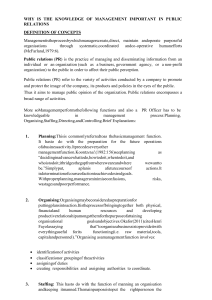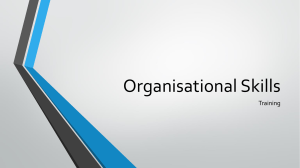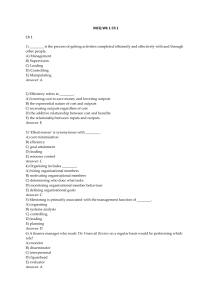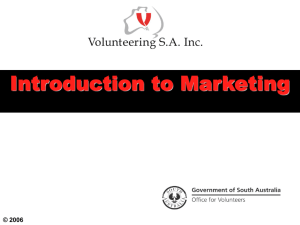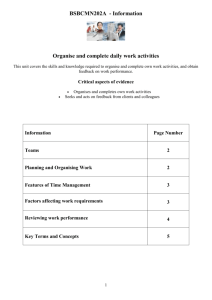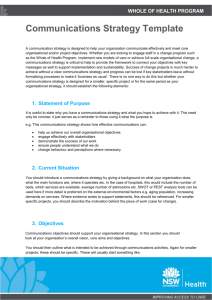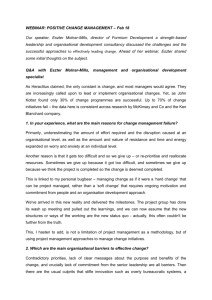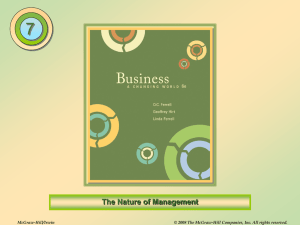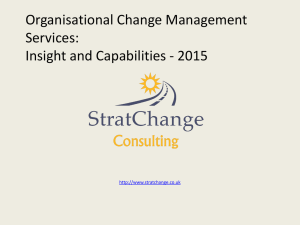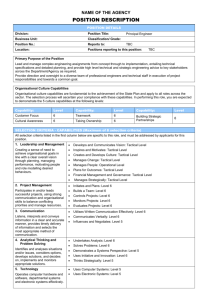Lecture 06
advertisement
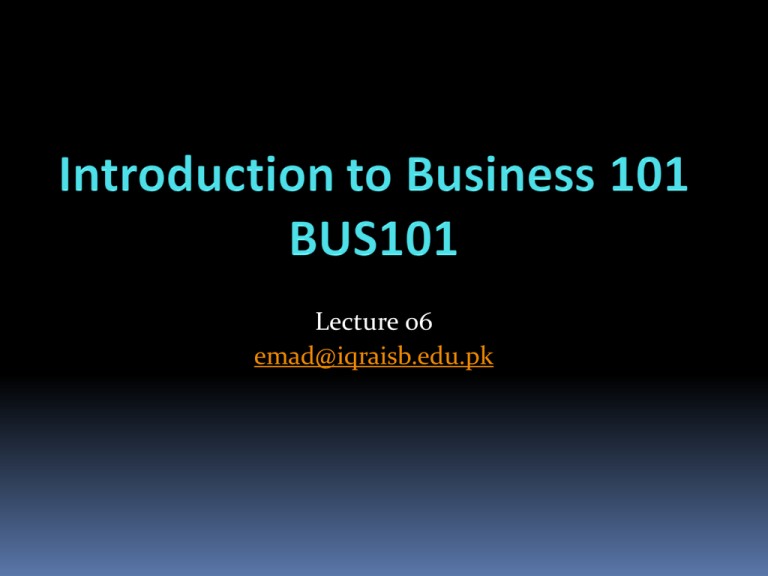
Lecture 06 emad@iqraisb.edu.pk Primary Functions. Management is a process used to accomplish organisational goals through implementation of its primary functions. The four primary functions of management include: Planning, Organising, Leading & Controlling. Planning. The process of setting objectives that will meet organisational goals. Goals > Broad long-term achievements that organisations air to accomplish. Objectives > Specific, short-term plans made to help realise goals. SWOT Analysis? How to use. Types of planning that are utilised: Strategic planning, Tactical planning, Operational planning & Contingency planning. » The first three differ in terms of breadth of vision and timespan considered. » The fourth type is “in case”.... Strategic planning > is broad long-range planning that outlines the goals of the organisation. Tactical planning > is specific, short-term planning that lists organisational objectives. Operational planning > is part of tactical planning and involves setting up specific timetables and standards. Contingency planning > involves developing an alternative set of plans in case of change. Organising. Involves allocating funds for various departments, assigning tasks and establishing procedures for accomplishing organisational objectives. Three levels of management: Top management (company executives, president), Middle management (general managers, division managers, plant managers), Supervisory management (first-line managers, supervisors. Managers need a certain set of skills in order to perform their duties. These can be classified into three categories: Technical abilities Ability to perform specific tasks such as selling products or developing software. Human relation skills Ability to communicate and motivate. Conceptual skills Ability to see organisations as a whole and the parts fit together. Different levels of management require differing levels of these skills. Top managers usually rely heavily on human relation and conceptual skills. They rarely use technical skills. First line managers need to have a greater level of technical and human relations skills. There conceptual skills are rarely put to the test. Middle managers need a balanced level of all three skills. – Remember “Business as Organisation” Managers or Leaders? Whats the difference? A manager plans, organises and controls functions within an organisation. A leader has vision and inspires others to grasp that vision, establishes corporate values, emphasises corporate ethics and doesn't fear change. One is activity centred and one is behaviour centric. Leader ship styles. Figure 7.7, page 225, Chapter 7, Book I. Effective leadership depends on the type of people being led and the situation. A challenge and one that is being addressed nowadays is how to setup self managing teams. Moving away from an autocratic leadership style to a decentralised structure. Needed for dynamic responses to fast paced changes. Empowerment is the giving of sufficient authority and responsibility to respond quickly to customer requests. Enabling is the term used to describe how giving workers the education and tools they need to assume their new decision making powers. Knowledge management involves finding the right information, keeping the information in a readily accessible place and making the information known to everyone in the firm. Knowledge management is another way of enabling workers to do the best job they can. Control. This involves: – – – measuring employee performance against objectives and standards, rewarding people for a job well done and taking corrective action if necessary. It includes five steps: Setting clear standards. Monitoring and recording performance. Comparing performance with plans and standards. Communicating results and deviations to employees. Providing positive feedback for a job well done and taking corrective action if necessary. Examples of Clear standards? How to monitor and record performance? How to compare performance with plans and standards? How to communicate results and deviations to employees? How to provide positive feedback for a job well done? How to take corrective action? » Discussion.... S.M.A.R.T. Specific. Measurable. Actual. Realisable. Timed. Standards should fit the above criteria for effectiveness in order to be successful. Decision Making.... Importance of decision making? – – – Why is it important to a manager's job. Similar to communication. Ideas? 7 D's The seven D's of decision making are: Define the situation. Describe & collect needed information. Develop alternatives. Development agreement among those involved. Decide which alternative is best. Do what is indicated (begin implementation). Determine whether the decision was a good one and follow up.
